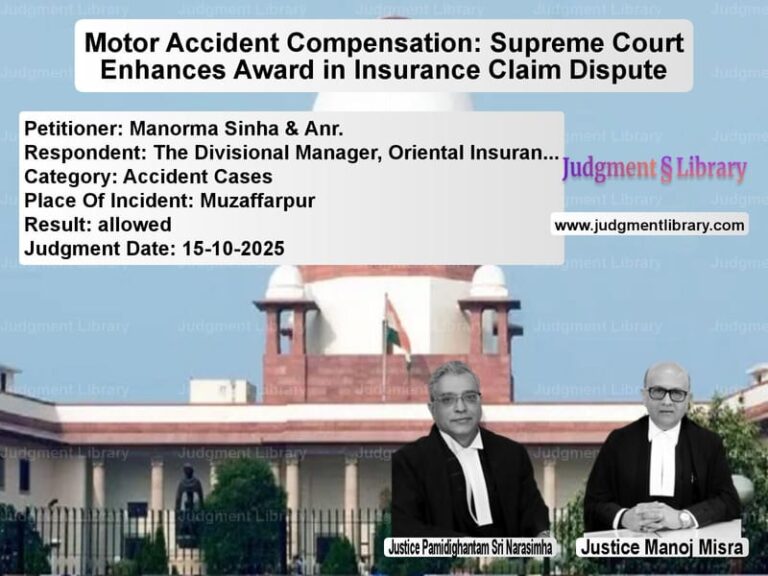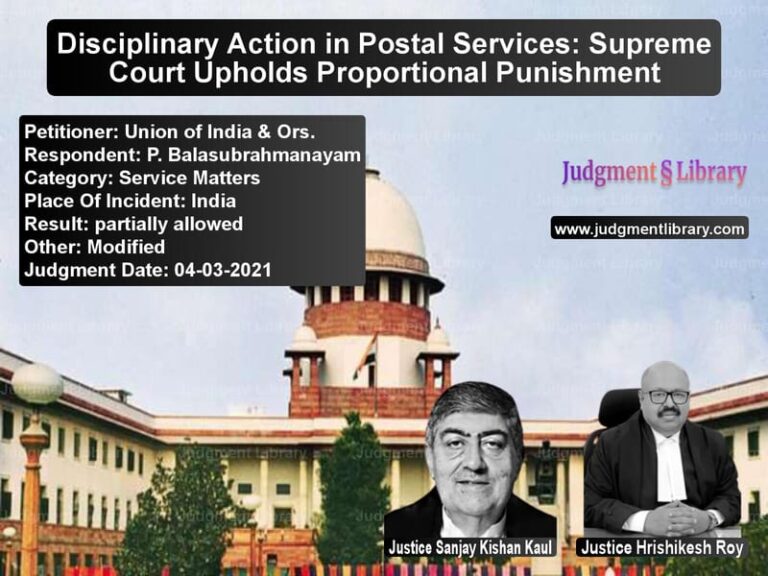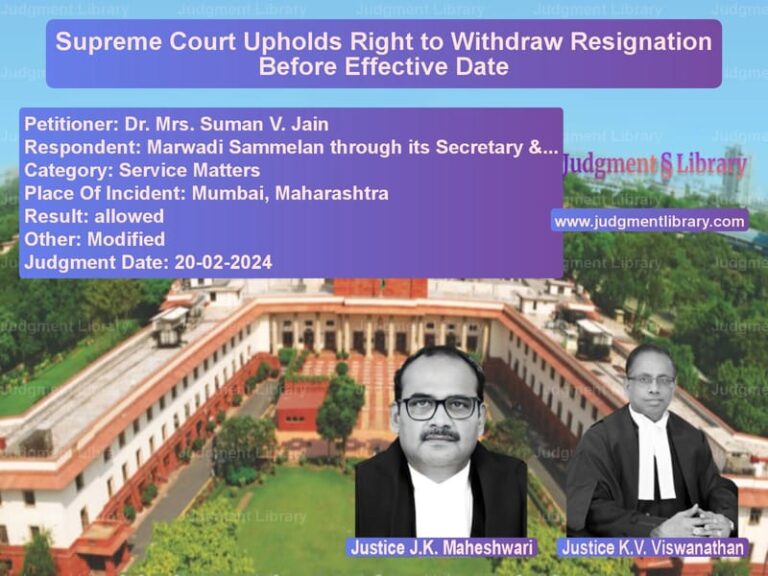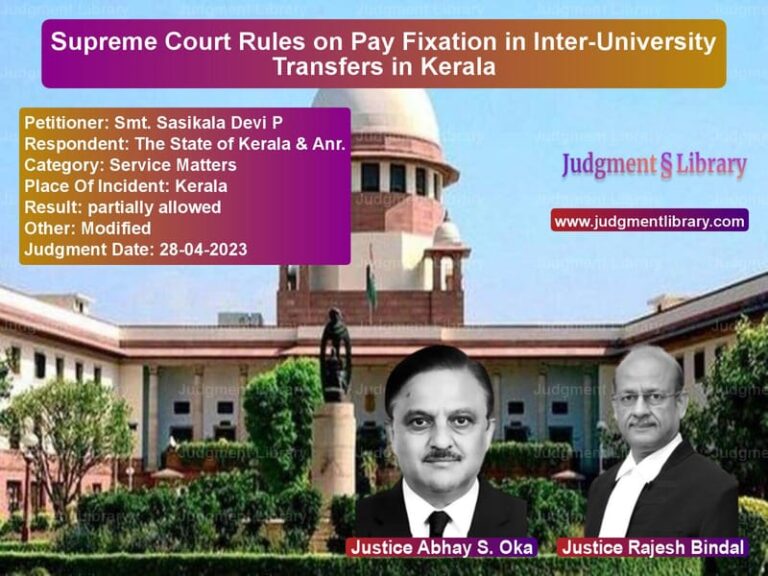Supreme Court Sets Aside High Court Order on Summoning Accused Under Section 319 CrPC
The case of Sagar vs. State of U.P. & Anr. revolves around the discretionary power of the courts under Section 319 of the Code of Criminal Procedure (CrPC), 1973. The Supreme Court’s judgment highlights the legal principles that must be followed while summoning an accused who was not initially charge-sheeted.
This appeal was filed by Sagar against the Allahabad High Court’s order that directed his summoning under Section 319 CrPC despite the trial court’s rejection of the application for his inclusion as an accused. The Supreme Court, after analyzing the evidence and legal precedents, quashed the High Court’s order and restored the trial court’s decision.
Background of the Case
The case arose from an FIR filed on September 10, 2014, at PS Fugana, Muzaffarnagar, Uttar Pradesh, under Section 302 IPC for the alleged murder of one Nitin. According to the complaint:
- Nitin and his brother Sachin were called by Jagpal and his nephew Sagar (appellant) to assist in tying a sugarcane crop.
- Later that morning, the complainant saw Jagpal and Sagar near Nitin, who was lying naked near an electric wire with burn marks around his neck.
- Upon calling out to them, Jagpal and Sagar allegedly fled from the scene.
Following an investigation, the police filed a chargesheet only against Jagpal, noting that Sagar was a minor at the time and his involvement in the crime was not established.
Arguments Presented by the Petitioner
Sagar, the appellant, contended:
- The police had thoroughly investigated the case and found no material against him.
- His name was arbitrarily removed from the chargesheet based on the investigation’s findings.
- The trial court had correctly rejected the application under Section 319 CrPC since there was no direct evidence linking him to the crime.
- The High Court wrongly overturned the trial court’s decision without appreciating the evidence on record.
Arguments Presented by the Respondents
The State of U.P. and the complainant countered by arguing:
- The complainant’s statement under oath implicated Sagar in the crime.
- The trial court failed to appreciate that both PW-1 (the complainant) and PW-2 (the victim’s father) had named Sagar as being present at the crime scene.
- The High Court’s order directing a re-examination of the application under Section 319 CrPC was justified.
Supreme Court’s Observations and Verdict
The Supreme Court analyzed the correctness of invoking Section 319 CrPC, which empowers a court to summon a person to face trial if it appears from the evidence that they have committed an offense. The Court made the following key observations:
Read also: https://judgmentlibrary.com/supreme-court-cancels-bail-in-puran-mal-vs-state-of-haryana-murder-case/
- Section 319 CrPC is an extraordinary and discretionary power that should be exercised sparingly.
- The prosecution must present strong and cogent evidence before a person not already charge-sheeted can be summoned.
- The complainant and his father were not eyewitnesses; their statements merely mentioned Sagar’s presence at the scene.
- The investigating officer had already found that Sagar’s involvement was not established beyond doubt.
- The trial court’s rejection of the Section 319 application was based on sound reasoning and should not have been overturned casually.
The Supreme Court referred to its landmark ruling in Hardeep Singh vs. State of Punjab (2014), which established:
- Section 319 CrPC should only be invoked when the evidence is stronger than a mere prima facie case but does not need to reach the standard required for conviction.
- Summoning an accused at a later stage should not be done casually and must be based on concrete material.
In light of these observations, the Supreme Court ruled:
- The appeal was allowed.
- The High Court’s order summoning Sagar was quashed.
- The trial court’s order rejecting the Section 319 application was restored.
Legal Precedents Considered
The Supreme Court referred to several key judgments:
- Hardeep Singh vs. State of Punjab (2014): Defined the scope of Section 319 CrPC.
- Michael Machado vs. Central Bureau of Investigation (2000): Held that the discretionary power under Section 319 should be exercised cautiously.
- Brindaban Das vs. State of West Bengal (2009): Emphasized that the power under Section 319 is not to be used mechanically.
Impact of the Judgment
This ruling has significant implications:
- It reinforces the principle that Section 319 CrPC should be applied judiciously and not as a routine procedure.
- It protects individuals from being dragged into criminal trials without strong and compelling evidence.
- It ensures that trial courts’ findings on evidence are respected and not overturned arbitrarily.
- It sets a precedent for future cases involving summoning of additional accused at later stages of trial.
By quashing the High Court’s order, the Supreme Court has upheld the importance of ensuring fairness and due process in criminal trials.
Petitioner Name: Sagar.Respondent Name: State of U.P. & Anr..Judgment By: Justice Ajay Rastogi, Justice Abhay S. Oka.Place Of Incident: Muzaffarnagar, Uttar Pradesh.Judgment Date: 10-03-2022.
Don’t miss out on the full details! Download the complete judgment in PDF format below and gain valuable insights instantly!
Download Judgment: sagar-vs-state-of-u.p.-&-anr.-supreme-court-of-india-judgment-dated-10-03-2022.pdf
Directly Download Judgment: Directly download this Judgment
See all petitions in Bail and Anticipatory Bail
See all petitions in Judgment by Ajay Rastogi
See all petitions in Judgment by Abhay S. Oka
See all petitions in allowed
See all petitions in Quashed
See all petitions in supreme court of India judgments March 2022
See all petitions in 2022 judgments
See all posts in Criminal Cases Category
See all allowed petitions in Criminal Cases Category
See all Dismissed petitions in Criminal Cases Category
See all partially allowed petitions in Criminal Cases Category







